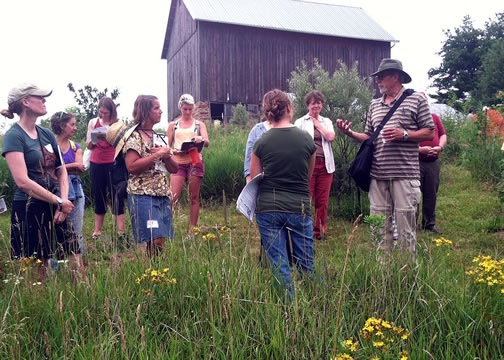
Christopher J. Patton [standing on right with a hat] is the Founder, President and Chairman of MEC’s Board. Separately, he markets River Hills Harvest (RHH) brand premium pure elderberry juice products throughout the USA as River Hills Harvest Marketers, LLC.
Midwest Elderberry Cooperative
The Midwest Elderberry Cooperative (MEC) was formed in 2012, originally as the Minnesota Elderberry Cooperative, under MN Statute 308B to be the organizational vehicle to assist small organic/natural farmers in elderberry production and processing in the Midwest. To read more about MEC’s early history click here.
MEC is governed by a board of directors elected by its members. Its primary funding comes from sales of elder berry and flower ingredients along with some grants. Most grants are awarded to MEC members due to the structure of most USDA and state programs and importantly, in accordance with the principle that the farmers must profit first or there is no reason for a cooperative.
Christopher J. Patton is the founder, chairman and president of MEC.Please email him first - info@midwest-elderberry.coop, or by phone at 612-418-4624.
Small communities don’t work economically in today’s world, which is why local food producers need connection with a broader, participating-in-ownership-and-resources network like a cooperative. They need to supplement the delivery of their produced food locally with the income and inputs of the cooperative network. It is the best way for growers to keep food prices affordable for most consumers in conjunction with producing economic benefits sufficient for the farmer and his local community to prosper over the course of their lifetimes.
Because they Taste Better!
Elderberries have higher levels of antioxidants anti-inflammatory nutrients than cranberries and tart cherries - very close in total ORACS to aronia / chokeberries. But they taste better being sweet-neutral with about half the natural sugar as grapes. Native North American Sambucus canadensis berries also taste better than their European cousins, Sambucus nigra. Farmers along the west coast of the USA also grow the tree-formed blue elderberry (Sambucus cerulea), which can be sweeter. In the US Southwest they are also referred to as Sambucus nigra mexicana.
Wild canadensis elderberry plants are woody shrubs often found along roadsides, forest edges and abandoned fields. Their native range spans most of North America east of the Rocky Mountains. Most sources now agree that the limited consumption of ripe berries raw is probably safe for most people. Andrew Thomas of the University of Missouri recently completed a three year research project that failed to find any significant presence of potentially harmful glycosides in Native North American Elderberry, Sambucus (nigra) canadensis. Originally, most researchers thought that native elderberry leaves, branches, stems, roots, unripe berries and seeds contained glycosides giving them a bitter taste that discourages pests. The body metabolizes glycosides into toxic cyanides; therefore, proper methods of harvest and processing were developed for European elderberries long ago.
European elder (Sambucus nigra) is grown commercially on that continent (today about 30,000 acres) going all the way back to Hippocrates, who wrote an entire book on the plant and its uses in healing. To supply what is needed for a variety of traditional healing practices, Europeans make syrups and cordials from elderberry flowers as well as the berries. Some even coat stemless flower umbrels with batter and fry them served topped with cinnamon and powdered sugar as desert. In the USA, elderflower production and processing remains in its very early stages with a number of hobbyists and small craft producers making and selling elderflower syrups, cordials or teas, for example. Download a two page info sheet on native Sambucus (nigra) canadensis.
Elderberry as a Commercial Crop
Presently, about 95% of all elderberry ingredients are imported, which means that almost all American made elderberry products use imported ingredients. Wild collected berries are considered certified organic by the European Union, which presents an economic challenge to American growers who must invest much more in their organic crops. Many of the imported certified organic European elderberries are wild collected, which have much lower levels of nutrients than the farmed ones. (See point 14 on the Functional Ingredients page.)
Along with the imported frozen and dried berries, European elderberry extracts, powders and concentrates come from that continent’s native species, Sambucus nigra. Because European commercial production typically freezes their elderberry harvest unwashed and on the stem, imported elderberry products are usually more highly processed to deal with the sanitation and unripe European nigra berry glycoside issues. They may be pasteurized, fermented, or heat processed up to three days in order to make concentrates or extracts. They may also contain added potassium sorbate as a preservative.
Until relatively modern times in America, elderberry flowers and berries were mostly collected from their wild, natural setting, but small scale elderberry growers have existed for centuries. They used elderberries in a wide variety of products following European traditions for local consumption. The Internet makes it easy to search out the ancient and modern uses of elderberry plant parts and fruits around the world.
Historically very few American farmers grew elderberries as a commercial crop, though they often kept them in hedge rows for personal use. This is changing due to growing consumer demand and shrinking imported supply. The University of Missouri discovered varieties from nature that yield larger and sweeter berries while possessing growth characteristics more suited to commercial cultivation, which was the foundation for the development of growing elderberry for commercial harvest by MEC member and Director Terry Durham of Eridu Farms and the River Hills Harvest brand. The number of farmers considering the commercial production elderberry is growing quickly due to its high demand as an ingredient as well as for its many environmental benefits as a specialty fruit perennial crop that supports many native pollinators and sequesters carbon.
Ingredient Development, Grants & Research
The cooperative’s directors actively seek grants to establish and expand our growers' objectives including the recruiting, education and financial success of MEC growers. Members decide on the acquisition and management of shared agricultural cultivation and harvest equipment, processing and storage facilities. MEC's commercial activities seek to benefit its growers, potential commercial partners and the general public through collective capital formation, aggregation of harvest and access to markets. [See Project 22-50.]
The successful development of networked elderberry grower cooperatives is progressing towards increased production and marketing of quality, certified organic ingredient elderberry products such as juice, flowers and frozen berries in various raw material and retail products. With help from Agricultural Utilization Research Institute (AURI), we are exploring a variety of potential ingredient products that MEC can produce and sell to food and beverage producers, kombucha brewers, cheese makers, wineries and craft breweries, for example. Individual grower specialty product development is encouraged to support and supply local foods.
We reach out to groups of interested potential growers though a variety of formats from farm tours and educational presentations by a variety of professionals to hands-on workshops in the field and in processing. We also actively work to encourage and facilitate scientific research by Midwest universities and institutes on North American elderberry cultivation, processing and neutraceutical potential. [See Elderberry & Environment.]
Everyone involved would love to see increased academic participation by an increasing number of universities, foundations and institutes in elder berry and flower research. We recognize the University of Missouri’s early leadership on our native varieties of Sambucus canadensis beginning with their very successful horticultural/agroforestry and extension work as well as their research from a medical or health perspective, the latter exemplified by their mouse models and other studies. MEC board members participated in the First International Symposium on Elderberry held at the University of Missouri in Columbia during June of 2013.
Beginning in 2015 through a series of meetings, the University of Minnesota has begun serious planning through its Forever Green Initiative and the Minnesota Institute for Sustainable Agriculture towards the establishment of native elderberry as a viable commercial crop. UMN and UMO Agroforestry departments have developed focused Extension Program materials for MN growers as well as identifying various research projects on elderberry in relation to its potential as a specialty crop for its potential benefits in environmental land, biome and water management.
About our Founder & President

At times referred to by others as a 21st Century “Renaissance Man”, Mr. Patton earned a masters degree in prehistory of the Old World and Archaeology of Israel (The Hebrew University, Jerusalem) as well as an MBA (University of St. Thomas, St. Paul, MN) with a focus on cross-cultural management.
Besides growing and processing elder berries and flowers, his work history include substantial time spent in these professions: archaeologist & college professor; investment broker & planner, Exec VP of a small full service advertising agency; information technologist managing ingredients and research data for major brand R&D food scientists; and 14 years teaching undergraduate and graduate level anthropology, history, business and marketing classes to adults at night as an adjunct for two Midwest universities. He is also president of River Hills Harvest Marketers, LLC, which distributes and markets the River Hills harvest brand of elderberry retail products nationally.
His Journey to Elderberry and How it Influences our Cooperative’s Values
Specialty Food Association’s 2018 Leadership Awards: Business Leadership: Christopher J. Patton, Midwest Elderberry Cooperative and River Hills Harvest Marketers, LLC.
Like What we are Doing?
To help maintain this web site and advance the mission of the Midwest Elderberry Cooperative, you may use the PayPal button below to provide financial support without any tax deduction. We are a growers’ cooperative seeking profitable operation: we are not classified as a federal or state charity.
How to help support this web site.
Updated 1/17/2016